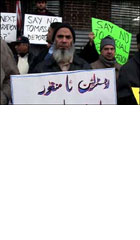
Point of Attack 2004
Distributed by Cinema Guild, 115 West 30th Street, Suite 800, New York, NY 10001; 212-685-6242
Produced by Kathleen Foster
Directed by Kathleen Foster
VHS, color, 46 min.
Jr. High - Adult
Human Rights, Terrorism, Asian American Studies, Criminal Justice, Law, Political Science
Date Entered: 09/01/2004
ALA Notable: ALA.gif
Reviewed by Jessica Schomberg, Minnesota State University, Mankato
This documentary argues that the profiling and detention of Arab, Muslim, and South Asian men following 9/11 under the auspices of the USA Patriot Act can and will have detrimental effects on American civil liberties in general.
The film contains interviews of detainees and activists from the New York/New Jersey area as well as White House press conference footage and footage from community meetings and protests between 2001 and 2003. Those detained were men from nations with primarily Muslim populations who had problems with their immigration papers or visas; not just undocumented men, but also men who were actively going through the citizenship process. The main points presented are that the names and numbers of detainees had not been released to the public (and perhaps still have not been—it’s unclear from the film); that even when families were able to find where their relatives had been detained, the detainees did not have access to their families or to their lawyers (which was also true during the forced registration of immigrants from 25 predominantly Muslim countries); that in some cases, those with access to lawyers were held on evidence that the government refused to share with either the accused or their lawyers; that it was not all undocumented aliens who were being detained, just Muslims; and that the financial, psychological, and emotional results of the detentions were devastating for both the detainees and their families.
Towards the end of the film there appeared footage of Lynne Stewart, a criminal defense attorney who was arrested and indicted on charges of providing material support for terrorism due to her work on behalf of Sheik Abdel-Rahman. As the film made the point that political activists were now being targeted by the same government that had detained Muslim men following 9/11, there was also a statement that “citizens could be stripped of their citizenship for speaking up.” This statement refers to the bill for the Domestic Security Enhancement Act, or Patriot Act II, which holds provisions for such an instance. However, to my knowledge, this bill has not been passed into law.
The picture and sound quality are good. The film is in spoken English except in a few instances, where English subtitles are provided.
While I wish that some of the statements in this film had stronger supporting arguments or some sort of bibliography, it does raise points that could prompt classroom discussions or further research. Therefore, it is recommended for high school and college audiences studying American government and current events.